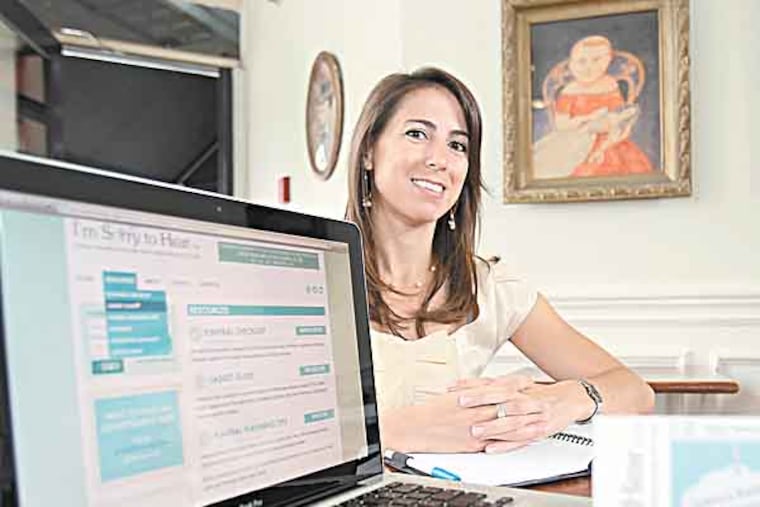Jeff Gelles: Providing online help for funeral planning
Compared with his many siblings, Rachel Zeldin's great-uncle Rafe led an adventurous life. He headed west, worked as a musician and as a roadie and hairstylist for jazz groups, and eventually settled in New Mexico. But he never married, had no children, and left no will or final directions.

Compared with his many siblings, Rachel Zeldin's great-uncle Rafe led an adventurous life.
He headed west, worked as a musician and as a roadie and hairstylist for jazz groups, and eventually settled in New Mexico. But he never married, had no children, and left no will or final directions.
When he died at 73, Rafael Perno had few resources. But he may have left his grand-niece a valuable legacy anyway: the germ of an idea for an online business Zeldin calls I'm Sorry to Hear L.L.C. and envisions as a "TripAdvisor for funeral planning."
If it sounds a bit macabre, well, that's hard to dispute. But Zeldin, who holds a business degree from Drexel University, makes a good case for why her website, www.imsorrytohear.com, addresses a real need: providing reliable, local information to consumers when they're at their most vulnerable.
That's the position Zeldin's mother found herself in when her uncle died in January 2011 and his elderly siblings seemed overwhelmed by logistics and costs. She stepped in, with an assist from her web-savvy daughter, and both were underwhelmed by the resources they found - mostly phone book-like lists of funeral homes.
Prices were baffling, with inconsistent package deals that made comparisons difficult. Some funeral directors were less than comforting.
"When all was said and done, we ended up with a wonderful funeral," Zeldin recalls. But it was painful to reach that point. She came away thinking, "There should be a better way to do this."
She reasoned that people spend weeks or months planning other important events, such as vacations or weddings, using online resources such as TripAdvisor. Why not something similar for events that must be planned in hours or days by grieving relatives?
Working from a home office in Yardley and with the help of contractors, Zeldin launched imsorrytohear.com in October with data on licensed funeral homes in Pennsylvania, New Jersey, and Delaware. This month, she expanded to New York, Maryland, Virginia, and Washington, D.C.
The site provides more information about funeral homes that have their own websites, listing special services - such as cremation or chemical-free "green" burials - and details such as religious or ethnic specializations.
How does it aim to make money? Zeldin offers an "enhanced profile" to funeral homes for $55 a month, enabling them to display extra information, photos, and video tours, and gain more prominent placement in search results.
Although there are only a handful so far, Zeldin hopes the site will eventually provide the kind of user reviews and ratings that consumers find valuable on TripAdvisor and similar sites. She encourages people to post feedback about their experiences - even from a year or two ago.
Meanwhile, Zeldin's site offers a planning checklist and tips, a guide to casket pricing, and information about other consumer resources, along with a blog on funeral-related issues.
Are there similar sites? Zeldin sees two other recent start-ups as her main competitors: eFuneral, an Ohio company that has portrayed its goal as being the "Yelp of funeral planning" but that so far doesn't offer funeral-home information for the Philadelphia region, and Illinois-based Funeralwise.
For those in need now, the nonprofit Consumers Checkbook offers similar advice and resources, as well as consumer ratings on 80 Philadelphia-area funeral homes - though its ratings, at www.checkbook.org, are available only to subscribers.
Checkbook actually does a good job of illustrating Zeldin's basic point - that funeral planning, and prices, are likely to be baffling. It sought prices for a sample funeral at homes its users rated. Among 56 homes rated as top-quality, prices varied from less than $6,000 to more than $11,000, and a third of the homes provided insufficient data.
Clearly, the bereaved could use some basic consumer help.